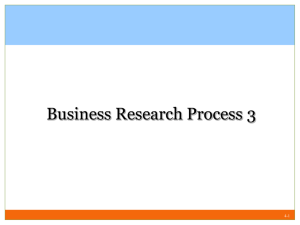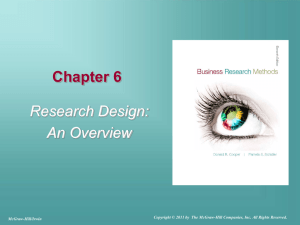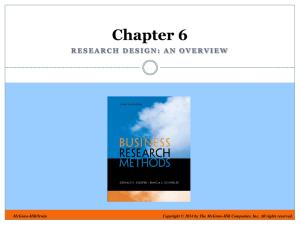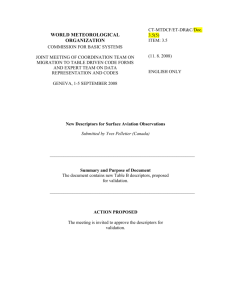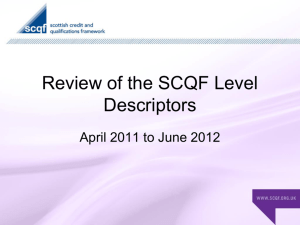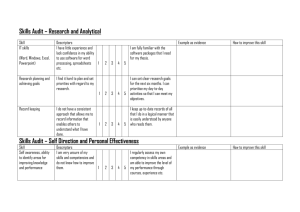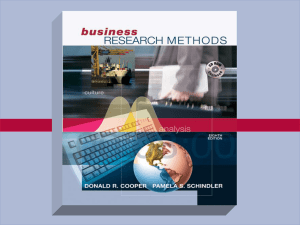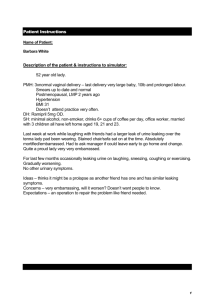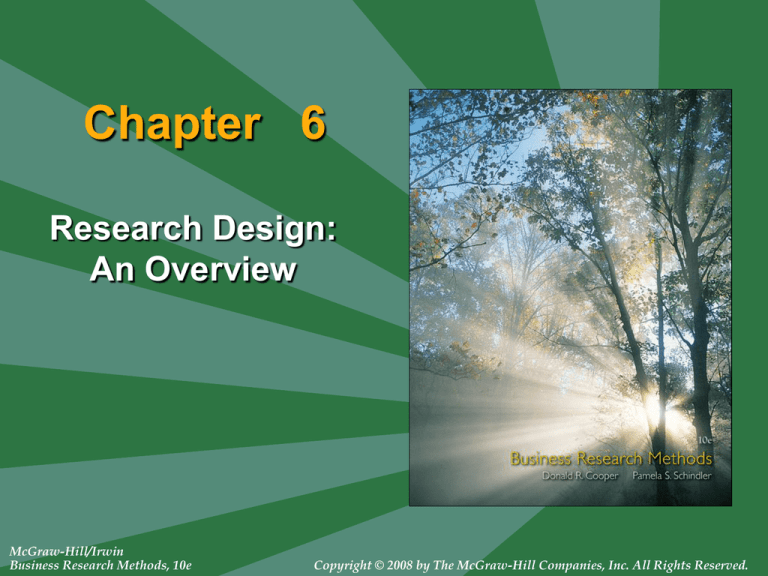
Chapter 6
Research Design:
An Overview
McGraw-Hill/Irwin
Business Research Methods, 10e
Copyright © 2008 by The McGraw-Hill Companies, Inc. All Rights Reserved.
6-2
Learning Objectives
Understand . . .
• The basic stages of research design.
• The major descriptors of research design.
• The major types of research designs.
• The relationships that exist between
variables in research design and the steps
for evaluating those relationships.
6-3
What Is Research Design?
Blueprint
Plan
Guide
Framework
What Tools Are Used in
Designing Research?
6-4
What Tools Are Used in
Designing Research?
MindWriter
Project Plan
in Gantt chart
format
6-5
6-6
Design in the Research Process
6-7
Descriptors of Research Design
Perceptual
Awareness
Purpose of
Study
Question
Crystallization
Descriptors
Data
Collection
Method
Experimental
Effects
Time
Dimension
Research
Environment
Topical Scope
6-8
Degree of Question Crystallization
Exploratory Study
• Loose structure
• Expand
understanding
• Provide insight
• Develop hypotheses
Formal Study
• Precise procedures
• Begins with
hypotheses
• Answers research
questions
Desired Outcomes
of Exploratory Studies
Established range and scope of possible
management decisions
Established major dimensions of
research task
Defined a set of subsidiary questions that
can guide research design
6-9
Desired Outcomes of
Exploratory Studies (cont.)
Developed hypotheses about possible
causes of management dilemma
Learned which hypotheses can be
safely ignored
Concluded additional research is not
needed or not feasible
6-10
6-11
Commonly Used Exploratory Techniques
Secondary
Data Analysis
Experience
Surveys
Focus
Groups
6-12
Face-to-face
interaction—one of the
best ways to learn from
participants.
6-13
Experience Surveys
• What is being done?
• What has been tried in the past with or
without success?
• How have things changed?
• Who is involved in the decisions?
• What problem areas can be seen?
• Whom can we count on to assist or
participate in the research?
6-14
Focus Groups
•
•
•
•
Group discussion
6-10 participants
Moderator-led
90 minutes-2 hours
6-15
Descriptors of Research Design
Perceptual
Awareness
Purpose of
Study
Question
Crystallization
Descriptors
Data
Collection
Method
Experimental
Effects
Time
Dimension
Research
Environment
Topical Scope
6-16
Data Collection Method
Monitoring
Communication
6-17
Descriptors of Research Design
Perceptual
Awareness
Purpose of
Study
Question
Crystallization
Descriptors
Data
Collection
Method
Experimental
Effects
Time
Dimension
Research
Environment
Topical Scope
6-18
The Time Dimension
Cross-sectional
Longitudinal
6-19
Descriptors of Research Design
Perceptual
Awareness
Purpose of
Study
Question
Crystallization
Descriptors
Data
Collection
Method
Experimental
Effects
Time
Dimension
Research
Environment
Topical Scope
6-20
The Topical Scope
Statistical Study
• Breadth
• Population inferences
• Quantitative
• Generalizable
findings
Case Study
• Depth
• Detail
• Qualitative
• Multiple sources of
information
6-21
Descriptors of Research Design
Perceptual
Awareness
Purpose of
Study
Question
Crystallization
Descriptors
Data
Collection
Method
Experimental
Effects
Time
Dimension
Research
Environment
Topical Scope
6-22
The Research Environment
Field conditions
Lab conditions
Simulations
6-23
Descriptors of Research Design
Perceptual
Awareness
Purpose of
Study
Question
Crystallization
Descriptors
Data
Collection
Method
Experimental
Effects
Time
Dimension
Research
Environment
Topical Scope
6-24
Purpose of the Study
Reporting
Casual Explanatory
Descriptive
Causal Predictive
6-25
Descriptive Studies
Who?
How much?
What?
When?
Where?
6-26
Descriptive Studies
Descriptions of
population characteristics
Estimates of frequency of
characteristics
Discovery of associations
among variables
6-27
Descriptors of Research Design
Perceptual
Awareness
Purpose of
Study
Question
Crystallization
Descriptors
Data
Collection
Method
Experimental
Effects
Time
Dimension
Research
Environment
Topical Scope
6-28
Experimental Effects
Ex Post Facto Study
• After-the-fact report
on what happened to
the measured
variable
Experiment
• Study involving the
manipulation or
control of one or
more variables to
determine the effect
on another variable
6-29
Ex Post Facto Design
Fishing Club Member
Non-Fishing-Club Member
Age
High Absentee
Low Absentee
High Absentee
Low Absentee
Under 30 years
36
6
30
48
30 to 45
4
4
35
117
45 and over
0
0
5
115
6-30
Causation and Experimental Design
Control/
Matching
Random
Assignment
6-31
Mills Method of Agreement
6-32
Mills Method of Difference
6-33
Causal Studies
Symmetrical
Reciprocal
Asymmetrical
6-34
Understanding Casual Relationships
Property
Behavior
Disposition
Response
Stimulus
6-35
Asymmetrical Casual Relationships
Stimulus-Response
PropertyDisposition
PropertyBehavior
Disposition-Behavior
6-36
Exhibit 6-6 Types of Asymmetrical Causal
Relationships
Relationship Type
Nature of Relationship
Examples
Stimulus-response
An event or change results in
a response from some object.
• A change in work rules leads to a higher level of
worker output.
• A change in government economic policy restricts
corporate financial decisions.
• A price increase results in fewer unit sales.
Property-disposition
An existing property causes a
disposition.
• Age and attitudes about saving.
• Gender attitudes toward social issues.
• Social class and opinions about taxation.
Disposition-behavior
A disposition causes a
specific behavior.
• Opinions about a brand and its purchase.
• Job satisfaction and work output.
• Moral values and tax cheating.
Property-behavior
An existing property causes a
specific behavior.
• Stage of the family life cycle and purchases of
furniture.
• Social class and family savings patterns.
• Age and sports participation.
6-37
Evidence of Causality
Covariation between
A and B
Time order of events
No other possible
causes of B
6-38
Descriptors of Research Design
Perceptual
Awareness
Purpose of
Study
Question
Crystallization
Descriptors
Data
Collection
Method
Experimental
Effects
Time
Dimension
Research
Environment
Topical Scope
6-39
Participants’ Perceptional Awareness
No deviation perceived
Deviations perceived
as unrelated
Deviations perceived as
researcher-induced
6-40
Descriptors of Research Design
Category
Options
The degree to which the research question has
been crystallized
• Exploratory study
• Formal study
The method of data collection
• Monitoring
• Communication Study
The power of the researcher to produce effects in
the variables under study
• Experimental
• Ex post facto
The purpose of the study
• Reporting
• Descriptive
• Causal-Explanatory
• Causal-Predictive
The time dimension
• Cross-sectional
• Longitudinal
The topical scope—breadth and depth—of the
study
• Case
• Statistical study
The research environment
• Field setting
• Laboratory research
• Simulation
The participants’ perceptional awareness of the
research activity
• Actual routine
• Modified routine
6-41
Key Terms
• Asymmetrical
relationship
• Case study
• Causal study
• Causation
• Children’s panels
• Communication study
• Control
• Control group
• Correlation
• Cross-sectional study
•
•
•
•
•
•
•
•
•
•
•
Descriptive study
Ethnographic research
Ex post facto design
Experience
Experiment
Exploratory study
Field conditions
Focus group
Formal study
Individual depth interview
Intranet
6-42
Key Terms (cont.)
•
•
•
•
•
•
•
Laboratory conditions
Longitudinal study
Matching
Monitoring
Primary data
Qualitative techniques
Random assignment
•
•
•
•
•
•
Reciprocal relationship
Research design
Secondary data
Simulation
Statistical study
Symmetrical relationship

